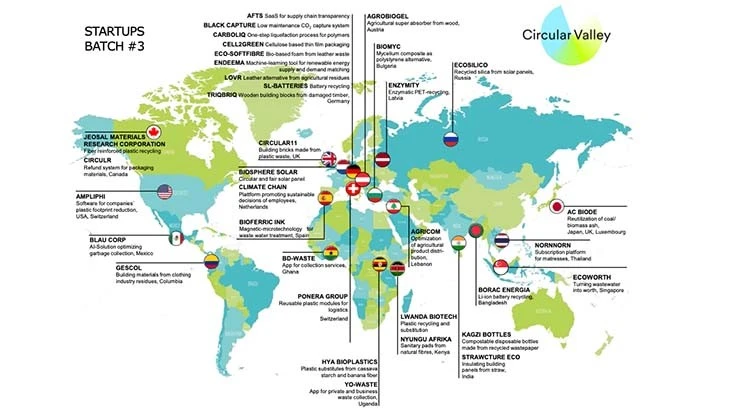
The German-based Circular Valley Foundation has provided an update on three dozen recycling- and landfill diversion-related companies from around the world in which it has invested as part of its “Batch 3” startup funding and support effort.
The early June announcement came almost exactly one year from Circular Valley’s previous recap of its efforts to provide what it calls “circular economy accelerator” funding to, at that time, 15 companies.
Circular Valley’s list of 36 recycling-related companies it is helping to fund includes United States-based plastic footprint software provider Ampliphi and two companies based in Canada: plastic scrap consumer Jeosal Materials Research Corp. and packaging materials refund system operator Circulr.
The company’s geographically diverse portfolio also includes companies nine companies in Germany; another eight in the European Union or Switzerland; six companies in Asia; five in Africa; two in Latin America; one in the United Kingdom; one in Russia; and one in the Middle East.
“Starting today, these 36 startups will collaborate with our Circular Valley partners to further develop and promote their innovative business models and technological solution,” Clara Hennings of the Circular Valley effort tells Recycling Today.
Hennings adds, “The selected start-ups are from 22 different countries and cover a large array of topics, ranging from innovative selection- and sorting approaches, over various recycling technologies (silicon recovery, lithium-ion battery or wind turbine recycling) to alternative applications of recycled materials.”
The Foundation says its seeks “start-ups with concrete ideas/inventions” tied to aspects of “designing out waste, production technologies with minimized environmental impact, marking technologies, product passports, tracking and tracing, collection, separation of waste streams, waste logistics, reuse models, novel recycling technologies, novel service models and digital enabling technologies.”
Latest from Recycling Today
- BMW Group, Encory launch 'direct recycling’ of batteries
- Loom Carbon, RTI International partner to scale textile recycling technology
- Goodwill Industries of West Michigan, American Glass Mosaics partner to divert glass from landfill
- CARI forms federal advocacy partnership
- Monthly packaging papers shipments down in November
- STEEL Act aims to enhance trade enforcement to prevent dumping of steel in the US
- San Francisco schools introduce compostable lunch trays
- Aduro graduates from Shell GameChanger program





